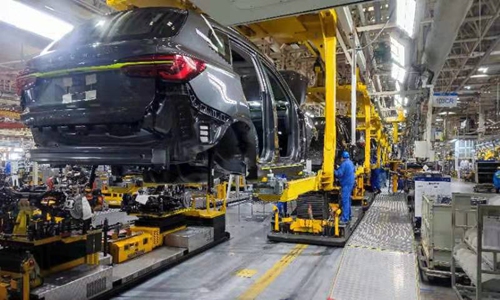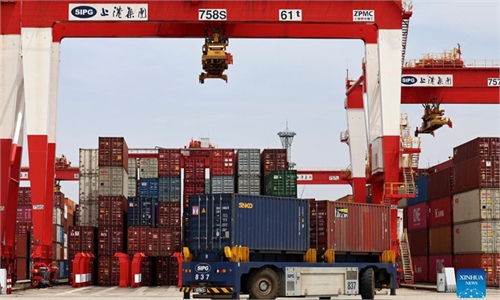Shanghai auto firms work overtime during May Day holidays to catch up on output
Firms work overtime during May Day holidays to catch up on output

Employees from SAIC Motor work on the production line at Lingang base in Shanghai. Photo: Courtesy of SAIC Motor
The auto sector in Shanghai, one of the city's most important industries, has been accelerating the resumption of production, with firms working overtime during the five-day May Day holidays to make up for production lost due to the COVID-19 outbreak.
Though uncertainties and challenges remain for work resumption in the car industry in the broader Yangtze River Delta region, companies could reach normal production in June and make up for the losses in the second half of the year, an industry analyst said.
A sales representative at IM Motors told the Global Times on Thursday that the company is actively coordinating work resumption and production at its factory in the Lingang new area, although the epidemic still poses uncertainties for deliveries.
IM Motors is an electric vehicle joint venture of Chinese automobile manufacturer SAIC Motor, Alibaba Group and Zhangjiang Hi-Tech.
To speed up the resumption of work, SAIC Motor's Lingang plant in Shanghai conducted a comprehensive survey of nearly 400 suppliers' capacity, inventory, raw materials and other aspects before the May Day holidays, according to a statement SAIC sent to the Global Times.
The company also set its 2022 sales goal at more than 6 million cars, which would be more than 10 percent higher than last year, SAIC said on April 29.
It completed a stress test on the management of logistics, closed-loop production and epidemic prevention measures on April 19.
As auto manufacturing involves tens of thousands of parts, the automobile sector, with a long industry chain, requires the concerted efforts of upstream and downstream enterprises to ensure the stability of production, industry analysts said.
A Shanghai-based auto accessory manufacturer told the Global Times on Thursday that the company had resumed production since it was on the third batch of Shanghai's whitelist companies allowed to resume work.
The company declined to be identified. "The delivery period is certainly delayed due to the epidemic. Therefore, we cannot supply all our customers at the same time. We don't want to be identified as we don't want our customers know who are our priorities," a manager of the company said.
More than 1,800 key enterprises in Shanghai have resumed over 70 percent of their work and production. Key industry chains such as automobiles, integrated circuits and biomedicine continued to recover and increase production capacity, Shanghai officials said on Thursday during a press conference.
Among the 666 enterprises on the first batch of the whitelist in Shanghai released on April 16, there were 249 automobile enterprises. The second batch of 1,188 manufacturers - released on April 28 - included a large number of enterprises for auto parts, chips and other components.
Meanwhile, Shanghai's Waigaoqiao port customs has completed customs clearance for more than 19,000 cars for export since April 16.
The work resumption of the car industry in Shanghai or the Yangtze River Delta bears national and international significance. Data showed that in 2021, China's automobile production was 26.528 million units, and Shanghai accounted for 10.68 percent of that.
In 2021, Tesla's Shanghai Gigafactory delivered 484,100 vehicles, up 235 percent year-on-year, accounting for 51.7 percent of Tesla's annual global deliveries.
Based on the current work resumption pace, the Yangtze River Delta region is expected to realize small-scale production in May and normal production in June, Zhang Xiang, a research fellow at the Research Center of Automobile Industry Innovation of the North China University of Technology, told the Global Times on Thursday.
"Five days of overtime during the May Day holiday will go a long way toward restoring capacity, but it is unlikely to reach normal levels," said Zhang.
The rate of workers getting back to their jobs in Shanghai is about 80 percent, but capacity is limited by the material and logistics constraints of the supply chain, Zhang noted.
"Auto manufacturers will have to work overtime in the second half of the year to supplement production," said Zhang.


